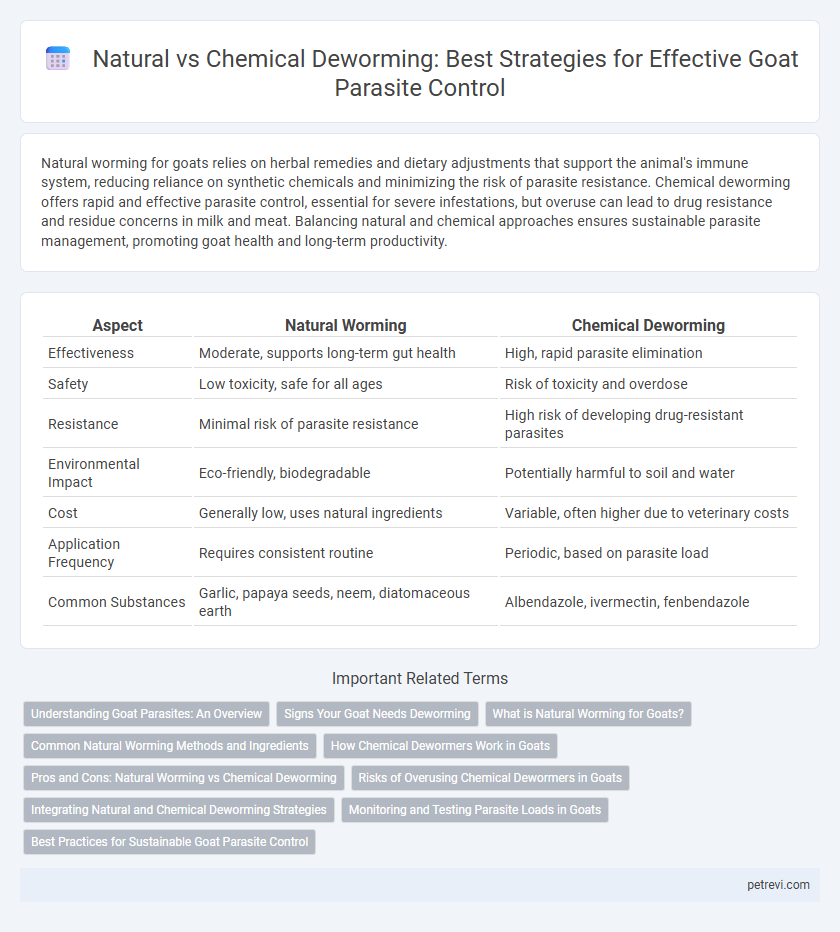Natural worming for goats relies on herbal remedies and dietary adjustments that support the animal's immune system, reducing reliance on synthetic chemicals and minimizing the risk of parasite resistance. Chemical deworming offers rapid and effective parasite control, essential for severe infestations, but overuse can lead to drug resistance and residue concerns in milk and meat. Balancing natural and chemical approaches ensures sustainable parasite management, promoting goat health and long-term productivity.
Table of Comparison
| Aspect | Natural Worming | Chemical Deworming |
|---|---|---|
| Effectiveness | Moderate, supports long-term gut health | High, rapid parasite elimination |
| Safety | Low toxicity, safe for all ages | Risk of toxicity and overdose |
| Resistance | Minimal risk of parasite resistance | High risk of developing drug-resistant parasites |
| Environmental Impact | Eco-friendly, biodegradable | Potentially harmful to soil and water |
| Cost | Generally low, uses natural ingredients | Variable, often higher due to veterinary costs |
| Application Frequency | Requires consistent routine | Periodic, based on parasite load |
| Common Substances | Garlic, papaya seeds, neem, diatomaceous earth | Albendazole, ivermectin, fenbendazole |
Understanding Goat Parasites: An Overview
Goat parasites commonly include gastrointestinal nematodes such as Haemonchus contortus, which cause anemia and weight loss. Natural worming methods use plant-based remedies like neem, garlic, and wormwood to reduce parasite load without chemical residues. Chemical deworming involves synthetic anthelmintics that target parasites quickly but risk resistance development and environmental contamination.
Signs Your Goat Needs Deworming
Signs your goat needs deworming include weight loss despite a good appetite, dull coat, and diarrhea. Pale mucous membranes and bottle jaw, a swelling under the jaw caused by protein loss, are clear indicators of heavy parasite infestation. Regular fecal egg count tests help detect internal parasites early, ensuring timely intervention with either natural worming remedies or chemical dewormers.
What is Natural Worming for Goats?
Natural worming for goats involves using herbal remedies, plants, and organic compounds such as garlic, neem, diatomaceous earth, and pumpkin seeds to manage internal parasites without synthetic chemicals. These natural treatments aim to boost the goat's immune system and disrupt parasite life cycles, promoting healthier digestion and overall well-being. Unlike chemical dewormers, natural worming methods reduce the risk of drug resistance and residue buildup in goat products.
Common Natural Worming Methods and Ingredients
Common natural worming methods for goats include the use of ingredients such as garlic, diatomaceous earth, and pumpkin seeds, which possess antiparasitic properties. Feeding goats these natural substances can help reduce internal parasites without the side effects associated with chemical dewormers. Incorporating herbal remedies like wormwood and neem leaves also supports parasite control by creating an inhospitable environment for worms in the gastrointestinal tract.
How Chemical Dewormers Work in Goats
Chemical dewormers in goats target internal parasites by disrupting their nervous system or metabolic pathways, causing paralysis or death of the worms. These synthetic compounds, such as benzimidazoles, ivermectins, and levamisole, are absorbed into the goat's bloodstream and reach parasites in the gastrointestinal tract. Proper dosage and timing of chemical dewormers are critical to effectively reduce parasite load while minimizing the risk of resistance development.
Pros and Cons: Natural Worming vs Chemical Deworming
Natural worming for goats employs herbal remedies like garlic, neem, and diatomaceous earth, offering a safer, eco-friendly approach with minimal risk of resistance but often lacks rapid efficacy. Chemical deworming uses anthelmintic drugs such as ivermectin and fenbendazole, providing fast, reliable parasite elimination but raising concerns about drug resistance and chemical residues in meat or milk. Balancing natural methods' sustainability with chemical treatments' effectiveness is critical for optimal goat parasite control strategies.
Risks of Overusing Chemical Dewormers in Goats
Overusing chemical dewormers in goats leads to parasite resistance, reducing the effectiveness of treatments and increasing the risk of persistent infections. Chemical residues may accumulate in goat products, posing health risks to consumers and livestock. Natural worming alternatives emphasize sustainable parasite control without compromising long-term herd health or product safety.
Integrating Natural and Chemical Deworming Strategies
Integrating natural worming remedies such as diatomaceous earth and herbal formulations with targeted chemical dewormers enhances parasite control in goats while reducing resistance development. Rotational grazing combined with periodic fecal egg count monitoring allows strategic timing of both natural and chemical treatments to maintain goat herd health. This integrated approach minimizes chemical residues in meat and milk, promoting sustainable and effective parasite management.
Monitoring and Testing Parasite Loads in Goats
Regular monitoring and testing of parasite loads in goats are crucial for effective parasite control and choosing between natural worming and chemical deworming methods. Fecal egg count (FEC) analysis provides accurate data on parasite burden, enabling targeted treatments that minimize resistance development. Consistent parasite load assessments help in adjusting deworming strategies, ensuring optimal goat health and sustainable parasite management.
Best Practices for Sustainable Goat Parasite Control
Natural worming methods for goats involve the use of medicinal plants such as wormwood, garlic, and pumpkin seeds, which provide a sustainable alternative to chemical dewormers by reducing drug resistance in parasite populations. Implementing rotational grazing, regular fecal egg counts, and maintaining proper sanitation are best practices that enhance the efficacy of natural parasite control. Combining these strategies with selective chemical deworming only when necessary promotes long-term goat health and minimizes environmental impact.
Natural Worming vs Chemical Deworming for Goat Parasite Control Infographic

 petrevi.com
petrevi.com